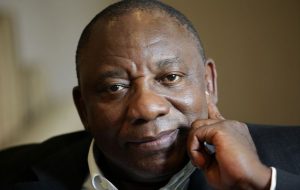


SA President Cyril Ramaphosa
EVEN though public finances are constrained, South Africa cannot afford to have power utility Eskom continue on its current path as it would have dire consequences for the economy and jobs, analysts have warned.
President Cyril Ramaphosa told the National Assembly lasy Thursday there is no “single solution” to fix the entity and a combination of interventions, such as a change to its structure, financial support from government and a turnaround plan from Eskom’s management are necessary to bring stability to SA’s biggest energy provider.
Hilton Trollip, a researcher on energy policy, said unbundling Eskom would result in cost-saving by separating the generation function from the transmission and distribution functions.
Another element of inefficiencies is the high staff levels which grew from 32 000 to 48 000 in just a decade, and associated costs which grew from R9,5bn to R29,5bn. All the while, the electricity production has not increased, Trollip pointed out.
Through the unbundling, it is envisioned that the transmission entity will get electricity from the cheapest source. Through a competitive tender bidding process, the most affordable energy source could be the state-owned generation business, which relies on coal mines and coal-fired power stations, or private players like Independent Power Producers which include renewable energy providers through wind and solar energy.
So far it appears Eskom’s finances will be stabilised through restructuring. Economists have put in perspective the effect of Eskom’s failure on the economy, if there is no restructure.
Johann Els, chief economist of Old Mutual Investment Group, thinks it is not likely government will take over R100bn of Eskom’s debt at this stage.
“It is more likely that Eskom will be given another fiscal injection to the tune of R15bn to R20bn,” he said. This bailout could be done in a “deficit neutral manner”, Els said. “For now, small injections are likely less risky than large debt transfers.”
Investec chief economist Annabel Bishop pointed out that there are limited government guarantees available to Eskom ― it has used 95 percent of its R350bn guarantee. Funds would have to be reprioritised from elsewhere, if government increases its expenditure, ratings agencies would view it negatively.
“In the budget, the funds for Eskom are likely to come from sale of non-strategic assets, the contingency reserve fund, unspent budgeted amounts from the previous fiscal year returned unspent to Treasury and from savings,” Bishop said.
Els also explained that a bailout as big as R100bn would likely trigger a ratings downgrade by Moody’s, which is the only ratings agency which has SA ranked at investment grade. –Fin24
Sorry. No data so far.

